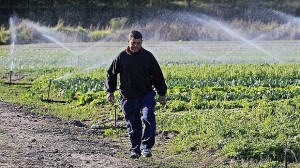Health risk as crops watered with effluent

Fruit and vegetables grown in NSW are being watered with human effluent because some farmers think it makes good fertilizer, showing “negligent disregard” for public health, a parliamentary inquiry has found.
Health authorities reminded the public to wash produce before eating it, amid warnings that affected crops were almost certainly being sold to consumers.
Camden Council, in Sydney’s south-west, told the inquiry into domestic waste water that of 130 intensive market gardens, at least two-thirds of them had failing sewage systems.
The council said water from septic tanks was overflowing into crop areas, buffer zones were breached and there was “widespread use of effluent hoses conveying waste water to crops”.
Penrith City Council reported that waste water often ended up in dams and was used to irrigate produce, while Eurobodalla Shire Council said raw sewage was being pumped onto community vegetable gardens.
The inquiry also found many effluent breaches on farms were deliberate, suggesting “a negligent disregard” or a lack of awareness, adding that some people believed untreated effluent was a valuable fertilizer. This meant that “many hundreds of people” potentially could be affected ”if crops or groundwater were contaminated”. The existing fine of $330 was inadequate, the councils said.
They also told the inquiry they lacked the power to seize crops or compel clean-ups and pleas for help from state government agencies, including health, food and agriculture authorities, had been ignored. The final report, which is being considered by the government, found “gaps in oversight” between agencies and councils had allowed problems that “require immediate attention”.
The health risk was considered highest in produce eaten raw, such as salad vegetables and fruit.
The report found the extent of misunderstanding over irrigating with waste water was ”widespread”.
But the chairman of the inquiry, Camden MP Chris Patterson, said the findings were not cause for panic.
“You are finding in a lot of market gardens … best practice isn’t being used [but] it certainly is not the majority,” he said.
However, Environmental Health Australia’s NSW secretary, Paul Reynolds, said it was highly likely that affected produce was reaching consumers. ”I would find it remarkable if all these veggies were being grown and not sold,” he said.
Mr Reynolds, who is also a council health official, said market gardeners often tried to work every spare centimeter of land to make their operation viable, which meant planting near areas previously set aside for effluent disposal.
He said NSW had been “remarkably lucky” to avoid disasters such as that in the US in 2011, when rock melons grown in Colorado and exposed to contaminated water caused a listeria outbreak, which killed 33 people.
The report recommended that information about the risks be made available and the NSW Food Authority should play a greater role, including confiscating crops where contamination was likely.
A NSW Health spokeswoman said the department was not aware of any people falling ill due to crops tainted with effluent, but she warned produce should be washed to protect against illness.
Wilberforce farmer Joe Sultana irrigates his vegetable crops with bore water. Treated waste water from his septic system was used only to water the lawn of his home.
He said while no farmer should water crops with effluent, authorities should “make them do it the right way because that is their job”.